
over-qualify your purpose. You need just
enough clarity to give yourself a direction but
not so much that you put blinders on. The
more constraints, the more limiting your op-
tions.
ten to everything. Remember the film Short
Circuit, where the robot, Number Five, goes
through all the encyclopedias, magazines,
newspapers and television channels, say-
ing, "Input, input, need more input"? Just
like Number Five -- and all artists -- writ-
ers are sponges for information, so you
need to immerse yourself in the outside
world and soak up enough information to
not only know what's been done so you
can be different, but to also fill your life
with enough raw material that will eventu-
ally spill out onto the page. As creative con-
sultant Sark said, "In the midst of our daily
lives, we must find the juice to nourish our
creative souls."
not want to wait for lightning to strike. You'll
need to be proactive. But you can't force it or
ulate your mind is to take "stimulating"
breaks at regular intervals. The Pomodoro
Technique of focusing on a task for 25 min-
utes and taking a five-minute break is perfect
for this. During these five minutes, you could
stretch, do some light pushups or jumping
jacks to get your blood pumping, read some
inspiring quotes, listen to motivational music,
play a short video game or do some brain puz-
zles, like crosswords or Sudoku.
There's a reason why so many writers like to
walk. It increases blood flow to the brain.
Exercise doesn't have to be a sweat-induc-
ing, lung-exploding aerobic activity. Walk-
ing is enough. You could also dance, which,
along with invigorating music, doubles your
chances for creative thoughts.
in common? They've all made creative con-
tributions to the advancement of mankind
-- and they were all avid nappers. It's not
just for kindergartners. If you want to be at
your creative best, take naps. It will recharge
your battery and allow your mind to wan-
inspiration. Just ask the
Coen brothers, who are
known for spending most of
the writing day napping.
fast food, we rush from one
place to another, constantly
on the go, tethered to Black-
berries and iPhones, and we
value quickness. Most cre-
ative insights, however,
don't happen in a rush.
They tend to pop up in re-
laxed times. So make an ef-
fort to slow down and
appreciate the quiet times
through meditation. Take
the time to breathe deeply
and relax.
Trust.
other creative people for
group brainstorming ses-
sions. They don't all have to
be writers. In fact, it would
be more beneficial if the cre-
forms, such as musicians, poets, artists or
even business executives.
from writers who started with, "This is a re-
ally original concept; it's never been done,"
only to realize, within seconds, that I could
name at least three movies or published
novels with the exact same story. It's the old
saying, "You need to know the rules before
you can break them." In order to come up
with something that's never been done be-
fore, you have to know what's been done be-
fore. It's your job to keep up with what sells,
what's in development, what's in produc-
tion, what's being released, what's being
published, etc. So if you come up with that
great idea only to discover there are four
other projects in development just like it,
put it aside and start again. The trick is to
keep thinking of new ideas.
just read about them, do them! And don't
forget to write down everything. You never
know when the muse will whisper that awe-
some new movie idea to you.